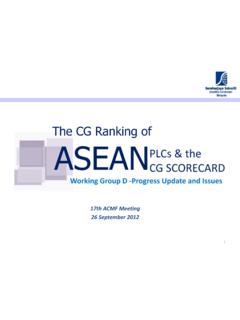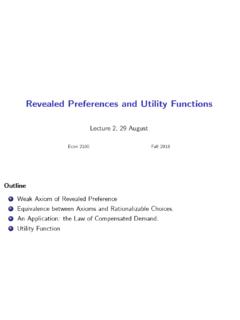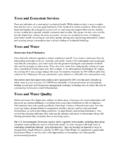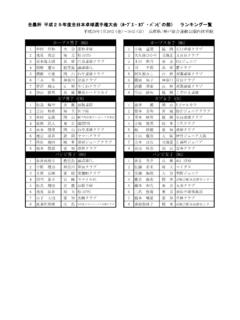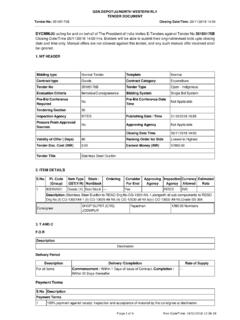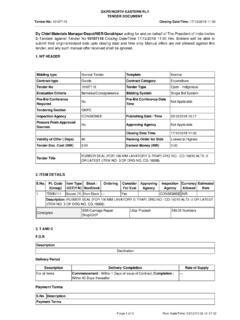Transcription of ACMF ASEAN CORPORATE GOVERNANCE SCORECARD
1 1 ACMF ASEAN CORPORATE GOVERNANCE SCORECARD A. BACKGROUND ASEAN Capital Markets Forum (ACMF) Implementation Plan In 2009, the ASEAN Finance Ministers endorsed the ACMF Implementation Plan to promote the development of an integrated capital market. This initiative is undertaken in parallel with the efforts to achieve convergence in ASEAN countries by 2015 as an economic community. Broadly the ACMF Implementation Plan seeks to achieve the objectives of the ASEAN Economic Community aspirations through the following areas: Creating an enabling environment for regional integration Creating the market infrastructure and regionally focused products and intermediaries Strengthening the implementation process Enhancing the visibility, integrity and branding of ASEAN as an asset class The ACMF CORPORATE GOVERNANCE Initiative The ASEAN CORPORATE GOVERNANCE initiative comprising the ASEAN CORPORATE GOVERNANCE SCORECARD ( SCORECARD ) and the ranking of CORPORATE GOVERNANCE of ASEAN public-listed companies (PLCs) are among several regional initiatives under the ACMF.
2 It started in early 2011 and is supported by the Asian Development Bank (ADB) through the Promoting an Interlinked ASEAN Capital Market regional technical assistance. The objectives of the SCORECARD and the ranking exercise are to: Raise CORPORATE GOVERNANCE standards and practices of ASEAN PLCs Showcase and enhance the visibility as well as investability of well-governed ASEAN PLCs internationally Complement the other ACMF initiatives and promote ASEAN as an asset class The ACMF Working Group D is responsible for this initiative. Members of Working Group D include capital market regulators and CORPORATE GOVERNANCE proponents from the region. Working Group D has been working towards enhancing a CORPORATE GOVERNANCE ranking methodology, leveraging off methodologies already implemented in ASEAN countries, as well as those applied by multilateral agencies such as the Organisation for Economic Co-operation and Development (OECD).
3 2 ACMF ASEAN CORPORATE GOVERNANCE SCORECARD Based on components and methodologies gathered, an assessment criteria and a CORPORATE GOVERNANCE template in the form of a SCORECARD has been developed. To maintain the objectivity and independence of the methodology, the ACMF has enlisted CORPORATE GOVERNANCE experts in the region to develop the SCORECARD and assessment criteria. The experts for the initiative were chosen based on their experience in CORPORATE GOVERNANCE ranking initiatives in their own countries and their recognition as authorities in the area of CORPORATE GOVERNANCE . They were recommended by the capital market regulators in individual countries. The experts, approved by ACMF, have no vested interests in PLCs and are not linked to securities regulators.
4 The CORPORATE GOVERNANCE experts responsible for the creation of the ASEAN CORPORATE GOVERNANCE Scorecards are: Professor Mak Yuen Teen (former) Co-director of the CORPORATE GOVERNANCE and Financial Reporting Centre and Associate Professor of Accounting, National University of Singapore Mrs. Rongruja Saicheua Executive Vice President, Thai Institute of Directors Mr. Salleh Hassan Director, Securities Industry Development Corporation (SIDC), Malaysia. Professor Sidharta Utama Professor, Faculty of Economics, University of Indonesia Dr. Jesus Estanislao Chairman, Institute of CORPORATE Directors Philippines Dr. Hien Thu Nguyen Vice Dean, Finance Department, School of Industrial Management, University of Technology, Vietnam National University of Ho Chi Minh City.
5 The following bodies in each country have been appointed as domestic ranking bodies to work with the experts on the application of the SCORECARD for ranking companies in each country: Indonesia Indonesian Institute for CORPORATE Directorship Malaysia Minority Shareholders Watchdog Group Philippines Institute of CORPORATE Directors Thailand Thai Institute of Directors In jurisdictions where similar body has not been appointed, application of the SCORECARD may be granted to specific persons authorized by the ACMF. 3 ACMF ASEAN CORPORATE GOVERNANCE SCORECARD Use of SCORECARD by any other party requires authorization and permission from ACMF. B. ASEAN CORPORATE GOVERNANCE SCORECARD Principles Underlying the SCORECARD The development of the SCORECARD was guided by the following principles: The SCORECARD should reflect global principles and internationally recognised good practices in CORPORATE GOVERNANCE applicable to PLCs and in some instances may exceed the requirement and standards recommended in national legislations.
6 The SCORECARD should not be based on the lowest common denominator but should aim to encourage PLCs to adopt higher standards and aspirations The SCORECARD should be comprehensive in coverage, capturing the salient elements of CORPORATE GOVERNANCE The SCORECARD should enable gaps in CORPORATE GOVERNANCE practices amongst ASEAN PLCs to be identified and draw attention to good CORPORATE GOVERNANCE practices The SCORECARD should be universal and capable of being applied to different markets in ASEAN The methodology should be robust to accurately assess the CORPORATE GOVERNANCE of PLCs beyond minimum compliance and box-ticking There should be extensive and robust quality assurance processes to ensure independence and reliability of the assessment Step 1.
7 Initial Development The OECD Principles of CORPORATE GOVERNANCE (OECD Principles) were used as the main benchmark for developing the SCORECARD , given its global acceptance by policymakers, investors and other stakeholders. Consequently, many of the items in the SCORECARD may be best practices which go beyond the requirements of national legislation. The experts also drew references from the existing body of work and ranking initiatives in the region, including those by institutes of directors, shareholder associations and universities, to guide the initial inclusion of items in the SCORECARD . 4 ACMF ASEAN CORPORATE GOVERNANCE SCORECARD The SCORECARD covers the following five areas of the OECD Principles: A. Rights of shareholders B.
8 Equitable treatment of shareholders C. Role of stakeholders D. Disclosure and transparency E. Responsibilities of the board The weightage allocated per Section in Level 1 is as below: A. Rights of shareholders 10% B. Equitable treatment of shareholders 15% C. Role of Stakeholders 10% D. Disclosure and Transparency 25% E. Responsibilities of the Board 40% Total Weightage of Sections in Level 1 100% Level 1 Five major sections that correspond to the OECD Principles: Part A: Right of Shareholders (26) Part B: Equitable Treatment (17) Part C: Role of Stakeholders (21) Part D: Disclosure & Transparency (42) Part E: Responsibilities of the Board (79) Total no of items/ descriptors (185) Level 2 Two additional sections Bonus & Penalty Bonus items for companies that go beyond minimum standards (11) Penalty items for companies with poor practices (23) Total bonus and penalty items (34) There are two levels to the ASEAN CG SCORECARD 5 ACMF ASEAN CORPORATE GOVERNANCE SCORECARD The use of two levels of scoring is designed to better capture the actual implementation of the substance of good CORPORATE GOVERNANCE .
9 Level 1 comprises descriptors/items that are in essence indicative of (i) the laws, rules, regulations and requirements of each ASEAN member country, and (ii) basic expectations of the OECD Principles. Level 2 consists of (i) bonus items reflecting other emerging good practices, and (ii) penalty items reflecting actions and events which are indicative of poor GOVERNANCE . Step 2: Refinement and Validation The SCORECARD was reviewed on an item-by-item basis against the OECD Principles, other international CORPORATE GOVERNANCE principles and practices recommended by bodies such as the World Bank, International CORPORATE GOVERNANCE Network (ICGN), Asian CORPORATE GOVERNANCE Association (ACGA) and selected codes of CORPORATE GOVERNANCE .
10 Each item in the SCORECARD was cross-referenced to at least one of these benchmarks. The SCORECARD was put through a validation process (referred to as beta testing); by applying it to a sample of companies in each country to ensure that the wording of the items in the SCORECARD is widely comprehensible and universally applicable to the extent possible. The validation process also sought to identify the sources of information for the SCORECARD items and any laws, regulations and listing rules applicable to each item for each country. The SCORECARD was also put through a peer-review exercise to ensure that there will be no discrepancies in the standard of assessment applied by each of the experts. The CORPORATE GOVERNANCE experts met with a senior representative from the Organisation for Economic Co-operation and Development (OECD) in August 2011 and this engagement resulted in the endorsement of the SCORECARD and methodology by the OECD.
